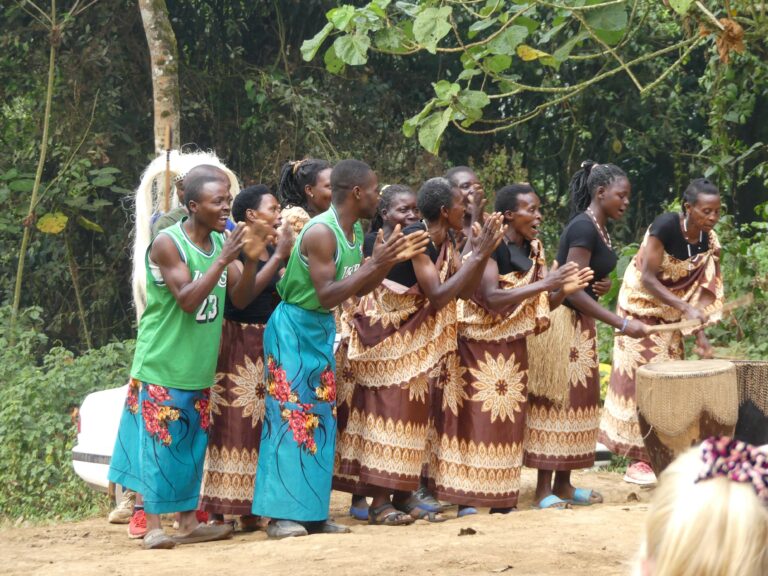Staying at Karungi Camp means you will be able to meet and mingle with the locals.
We have Blacksmiths, carvers, farmers, wood carvers, weavers and crafters.
The Carvers
Our carvers use ‘pangas’ or machetes to carve a variety of handmade goods.
Michael Kasule learned his craft by volunteering at a local woodcarving workshop as a child. At the age of 17 he started selling his own carvings and now trains apprentices of his own at his workshop in Rubuguri.
Since joining the Bwindi Tourism Club Crafters, they have used their skills to make new items, including local tribal masks, coasters and magnets. They have also started experimenting with new colours, beyond the normal black shoe polish!
"I love to create art that reflects my country. Art is something that fills my mind and heart. I choose to live in Rubuguri because of its natural beauty and the opportunity to sell my art. Taking a piece of wood and making it into something makes me very happy. Carving is my love and my business. It isn’t always easy to earn a living, but it is my passion and something I can’t imagine not doing it." - Michael Kasule
William Ndagije spent his early life farming before deciding to make a career change and teach himself to carve. For twenty years William has been the man his community comes to when the need good functional wooden items for the household – bowls for meals, mingling sticks for cooking, stools for sitting and even hoe handles for working the fields. He now sells beautiful crafts from his workshop in Nombe.
Emmanuel is the producer of local cooking spatulas. Prior to joining the Bwindi Tourism Club Crafters, he made these wooden utensils and sold them to locals at the weekly market in Rubuguri. Their practical design means that they are widely used in local homes and they have the producer’s unique fire-scorched design on their handle.
Demus and Oscar are our woodcarving apprentices. Their particular strengths are carving gorillas and gorilla masks which they do from a workshop in Nyabaremura. Their toolkit consists of a ‘panga’ (local name for a machete), a set of chisels between them and a local mallet. Holding the piece of wood with their bare feet they start by ‘sketching’ the design with the panga before completing it with the mallet and chisels.
The Weavers
The Ryamigogo Women’s Group
These 8 ladies met once a week to weave and catch up on local news. Creating beautiful yet useful products for sale to tourists adds significantly to their annual income.
Coasters, placemats and baskets are some of the most popular items made by the ladies. They weave their items from two different grasses and use only leaves, herbs, berries, and bark as dye to achieve colors they use.
The Women of Hope
These seven women have HIV and are widows because of the disease. They met 8 years ago at the Rubuguri Clinic and decided to form a craft group to supplement their income. Weekly they come together to do their weaving.
Accessories
Polina Twangye
Polina Twangye produces jewelry for the Bwindi Tourism Club Crafters. All her jewelry is handmade and made out of cut recycled paper, seeds and shells. All the colors are from the original paper and not painted or coated. Her artistic choice is to let the natural materials show through rather than cover them with paints, varnishes or other chemicals. She uses a simple sealer to make a waterproof item that is easy to care for. Each necklace requires on average 40 beads to make.
Since working with the Bwindi Tourism Club Crafters she has used her skills in making necklaces to now also make matching earrings and a number of bracelet styles.
Rose Rweitu specializes in weaving using banana leaves. She is a mother of 6 children, a farmer and an artisan.
